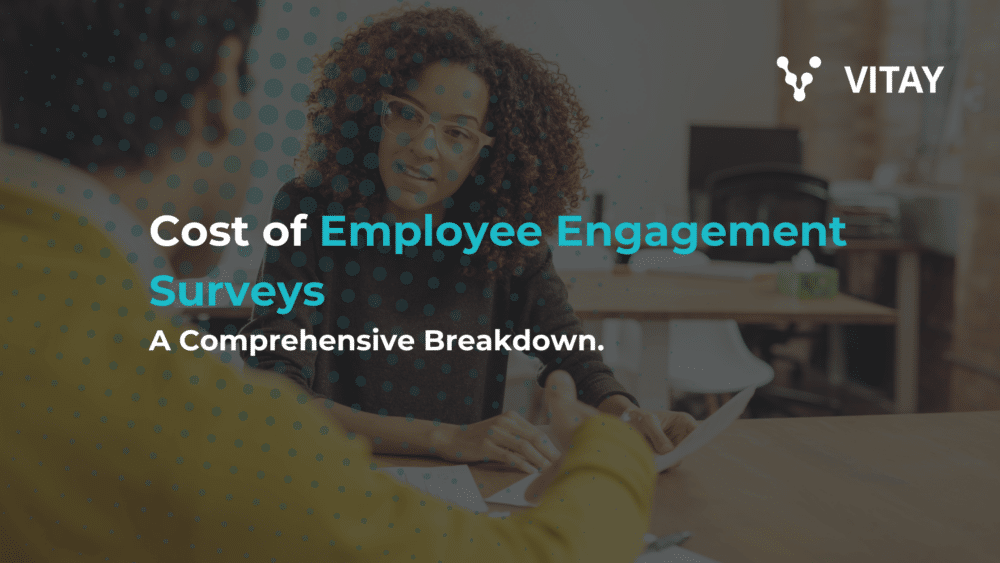Disengaged employees could cost your company money. According to research from Gallup, the total cost of low engagement has skyrocketed to $8.8 trillion. For context, that number is equal to 9% of the global GDP.
Many organizations have gotten smarter about the detrimental effects of low engagement and are doing something about it. Hence, the rise of the employee engagement survey.
Employee engagement surveys play a crucial role in understanding the pulse of an organization. By offering valuable insights into employee satisfaction, morale, and overall engagement, these surveys empower businesses to cultivate a more positive and productive workplace culture. However, before embarking on such initiatives, it’s essential for organizations to grasp the average cost of employee engagement surveys, along with the key factors that influence pricing—such as survey length, workforce size, and reporting complexity.
Understanding these considerations enables organizations to make more informed decisions, balancing their needs with budget expectations to drive meaningful results.
The Average Cost of Employee Engagement Surveys
The average cost of employee engagement surveys ranges between $3,000 and $30,000, depending on factors like participant count, survey length, and reporting complexity. The range is rather broad because there are so many different circumstances that will dictate the intricacy and scope of each survey.
Factors Influencing the Cost of Employee Engagement Surveys
- Length and Complexity of the Survey – The most prominent factor that will come into play is how long the survey is and how robust the inquiries need to be. Surveys that are longer and more detailed generally cost more. Complex surveys that delve into multiple facets of employee engagement require more time and resources to develop and analyze. For reference, most reasonable employee engagement surveys have about 30 questions.
- Number of Participants – The size of the workforce directly influences survey costs. Larger organizations may incur higher costs due to the need for more comprehensive data collection and analysis. You’ll need to look at goal responses and base your project on that number, since not everyone is likely to respond. This will also impact your result analysis and the margin of error. Good response rates can range from 30% – 80%, depending on the size of your organization and industry.
- Reporting Features – Basic reports may come at a lower price point, while advanced analytics, including detailed insights and benchmarking, can significantly increase costs. You may also want to leverage tools like an online portal with charts or full cross-tabulations to help analyze your audience. Business leaders should assess what level of reporting aligns with their needs.
- Provider Reputation and Additional Services – As with most things in business, higher quality will come with a higher price point. Established providers with a strong reputation may charge more for their services. Additional offerings such as consultation, survey customization, and follow-up services can also add to the overall cost. You can learn more about the offerings at specific price points below.
Average Pricing Tiers of Employee Engagement Surveys
As you can see, there is quite a wide range when it comes to the average cost of employee engagement surveys. Though there are several factors that will impact the pricing of your specific survey, there are some general offerings that you can use to anticipate pricing based on your needs. Take a look at the deliverables you can expect at a variety of price points.
$5,000 Tier
- Basic survey template with a limited number of questions focused on core engagement metrics.
- Access to online survey tools for distribution to employees.
- A summary report with key findings and some basic analytics.
- Minimal consultation or support; occasionally through email.
$10,000 – $15,000 Tier
- Customized survey design with questions tailored to your company’s specific areas of focus.
- Enhanced data collection with options for survey distribution, likely including mobile options and anonymous responses.
- Comprehensive reporting with insights, trend analysis, and actionable recommendations.
- Some level of consultation to discuss findings and next steps; more personal troubleshooting.
Around $25,000
- A comprehensive engagement strategy including multiple surveys or pulse checks throughout the year.
- In-depth analysis with predictive modeling and robust benchmarking.
- Customized action plans based on survey results, along with follow-up assessments and trending over time.
- Action plans based on survey results, tailored to your unique company, with follow-up assessments.
$50,000 and Above
- All of the items from the $25,000 pricing tier.
- Employ learning programs including workshops to train managers on interpreting results and implementing new engagement strategies.
- Continuous support and consultation with proactive check-ins and updates on engagement efforts with a live team.
Benefits of Employee Engagement Surveys
One of the most common questions around employee engagement surveys is whether or not they prove worth it. The ROI you get from an engagement initiative will vary based on several factors, but there are a few core benefits that you can count on. Extensive research from Gallup shows the following quantifiable advantages:
- Improved Employee Retention – Organizations that conduct regular engagement surveys experience 59% lower turnover rates, saving on recruitment and training costs.
- Enhanced Productivity – Engaged employees contribute to a 41% reduction in absenteeism, which boosts overall productivity.
- Positive Impact on Organizational Culture – Surveys foster a culture of openness and communication, leading to improved morale and collaboration among employees.
How to Choose the Right Provider for Surveys
When selecting a provider for employee engagement surveys, consider asking the following key questions:
- What customization options are available to tailor the survey to our organization’s specific needs?
- What reporting features do you offer, and how can they help us interpret the results?
- How do you ensure the reliability and validity of the survey data?
Understanding your organizational needs and what you hope to get out of the survey is crucial to choosing the right provider. This will help ensure that you select a survey solution that aligns with your goals and budget.
Understanding the average cost of employee engagement surveys will help organizations looking to enhance their workplace culture and improve employee satisfaction. However, it’s important to remember that those figures don’t tell the whole story. By evaluating your needs and comparing different providers, your business can make informed decisions that yield significant value and drive engagement. Employee engagement surveys should not be viewed as just an expense, but a strategic move toward fostering a more engaged and productive workforce.





Comments are closed.